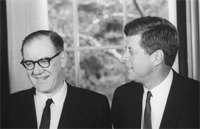Conception Roger's Roundtable The March Group Labor Law Study Group
In the early 1960s the Kennedy administration was fighting inflation in the US and had soldiers in Vietnam. Of particular concern was the price of steel which could impact on both endeavours, being a component of many household appliances, cars and also defense equipment. The head of the Council of Economic Advisers warned that an increase in steel prices ‘was the greatest single threat’ to the nation’s ‘economic stability’.
 As part of his efforts to achieve price and wage restraint Kennedy arranged a January 1962 meeting between himself, Roger Blough, chief of US Steel (which produced a quarter of all steel in the US and therefore tended to set the pay scales in the industry), Dave McDonald, head of the United Steelworkers, and Arthur Goldberg, formerly counsel to the United Steelworkers and, at the time, Secretary of Labor in the Kennedy administration. The negotiations initiated at that meeting culminated in an April agreement on a minimal wage increase in line with productivity growth. Kennedy was delighted, believing the steel industry had tacitly agreed to hold the lines on prices, so long as the line on wages was held.
As part of his efforts to achieve price and wage restraint Kennedy arranged a January 1962 meeting between himself, Roger Blough, chief of US Steel (which produced a quarter of all steel in the US and therefore tended to set the pay scales in the industry), Dave McDonald, head of the United Steelworkers, and Arthur Goldberg, formerly counsel to the United Steelworkers and, at the time, Secretary of Labor in the Kennedy administration. The negotiations initiated at that meeting culminated in an April agreement on a minimal wage increase in line with productivity growth. Kennedy was delighted, believing the steel industry had tacitly agreed to hold the lines on prices, so long as the line on wages was held.
Four days later Blough announced a 3.5 percent increase in the price of US Steel. Kennedy was said to be ‘livid with rage’ at this, realizing the increase would make him look weak and ineffective, make the unions appear as dupes, and feed inflation. He felt betrayed, accusing Blough of double-crossing him. He told his aides: ‘My father told me businessmen were all pricks, but I didn’t really believe he was right until now… God, I hate the bastards’. This comment was deliberately leaked to the press by the White House to show how angry Kennedy was.
There is some disagreement over the exact terms of abuse Kennedy used; the leak replaced ‘pricks’ with ‘sons of bitches’ and left off the reference to bastards but academic John M. Murphy notes that ‘Kennedy could never remember whether he called them sons of bitches, or bastards, or pricks’. One thing is certain though. No president since has been willing to show such public disrespect to big business.
Five other steel companies made the same price increases. At a press conference the next day Kennedy warned of the inflationary effects on prices of homes, cars, appliances, machinery and tools that the increase would have as well as adding an estimated $1 billion to the cost of US defenses. He stated:
Simultaneous and identical actions of United States Steel and other leading steel corporations, increasing steel prices by some 6 dollars a ton, constitute a wholly unjustifiable and irresponsible defiance of the public interest.
In this serious hour in our nation’s history, when we are confronted with grave crises in Berlin and Southeast Asia, when we are devoting our energies to economic recovery and stability, … and asking union members to hold down their wages, the American people will find it hard, as I do, to accept a situation in which a tiny handful of steel executives, whose pursuit of private power and profit exceeds their sense of public responsibility, can show such utter contempt for the interests of 185 million Americans.
The Kennedy administration retaliated against the recalcitrant steel executives with every means at its disposal. ‘Blough’s expense accounts were examined. And the U.S. government said it would buy steel only from those companies that did not raise prices.’ The Justice Department and the Federal Trade Commission began investigations and executives of US Steel were served with subpoenas to appear before a grand jury the next evening whilst Blough was giving a televised press conference in defense of the price rise. From the time of the price rise on Tuesday afternoon:
the president orchestrated a ferocious public opinion campaign against the price rise. Cabinet members detailed the effects of the increase on their areas of responsibility,…Attorney General Robert Kennedy spoke darkly of anti-trust actions, price collusion, and grand jury investigations. The FBI hauled people in for questioning at three in the morning.
On Friday the steel industry caved in. Firms that had not yet raised their prices kept them steady and Bethlehem Steel reversed its price increase. Realizing US Steel could not compete if other steel companies didn’t raise their prices as had been secretly agreed, Blough was forced to capitulate. The remaining steel companies followed suit, rescinding their price increases. It was a humiliating defeat for Blough and for the steel industry, one that they would not easily forget.